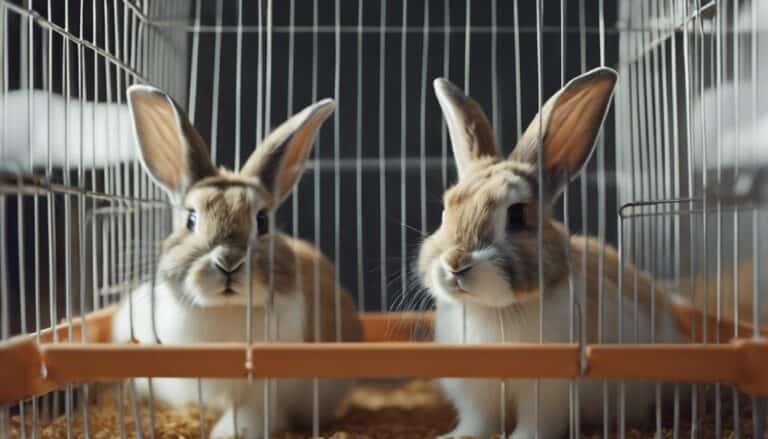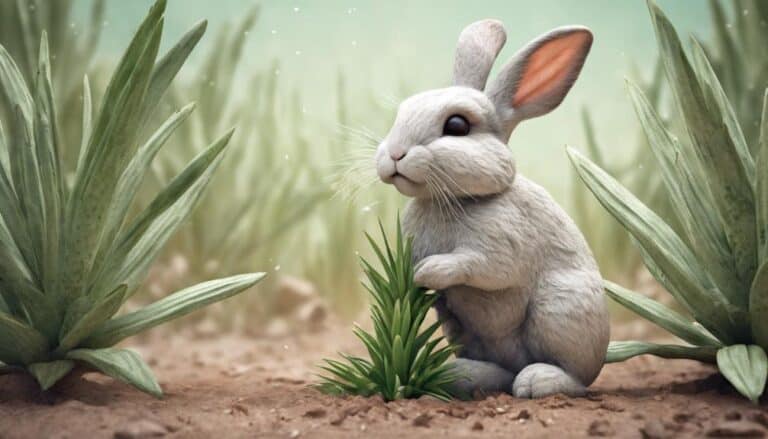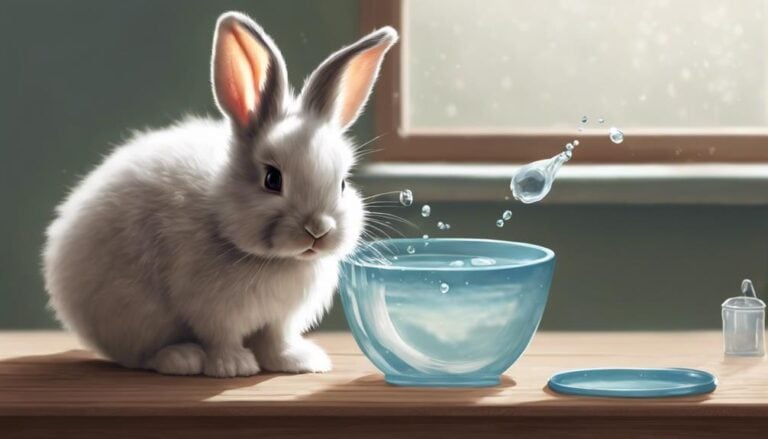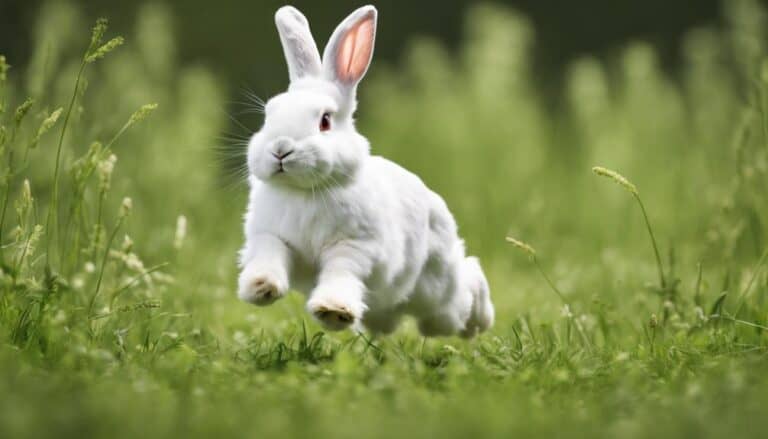If you're wondering whether rabbits make good pets because of their potential health issues and long lifespan, that's a fair concern.
But before you write them off, think about the unique benefits they can offer as companions. Rabbits are playful and affectionate, and they can bring a lot of joy into your life as pets.
But there's more to consider than just their cute antics. Having a rabbit or bunny as a pet comes with its own set of challenges and responsibilities.
So, what's the full picture like?
Contents
- 1 Key Takeaways
- 2 Pros of Owning Rabbits
- 3 Cons of Owning Rabbits
- 4 Rabbit Behavior Insights
- 5 Health Considerations for Rabbits
- 6 Rabbit Care Essentials
- 7 Rabbit Training Tips
- 8 Housing Requirements for Rabbits
- 9 Bonding With Your Rabbit
- 10 Rabbit Diet and Nutrition
- 11 Interactions With Other Pets
- 12 Conclusion
Key Takeaways
Rabbits can be a great fit for people living in apartments because they're quiet and don't take up a lot of space.
In fact, they're pretty intelligent, so you can teach them to use a litter box and even do some tricks.
One of the best things about having a rabbit as a pet is that it’s relatively low-cost compared to having a dog or cat. Additionally, rabbits require less food than larger pets and their grooming needs are minimal. This makes them an appealing option for families or individuals who want companionship without a significant financial burden. Ultimately, experiencing life with a pet rabbit can be rewarding, as they are affectionate and can form strong bonds with their owners.
However, it's really important to take your rabbit to the vet regularly to make sure they're healthy and catch any potential problems early on.
Rabbits also need some attention and care from you, like socialization and interaction, and a safe place to live, like a hutch, to keep them happy and healthy.
Pros of Owning Rabbits
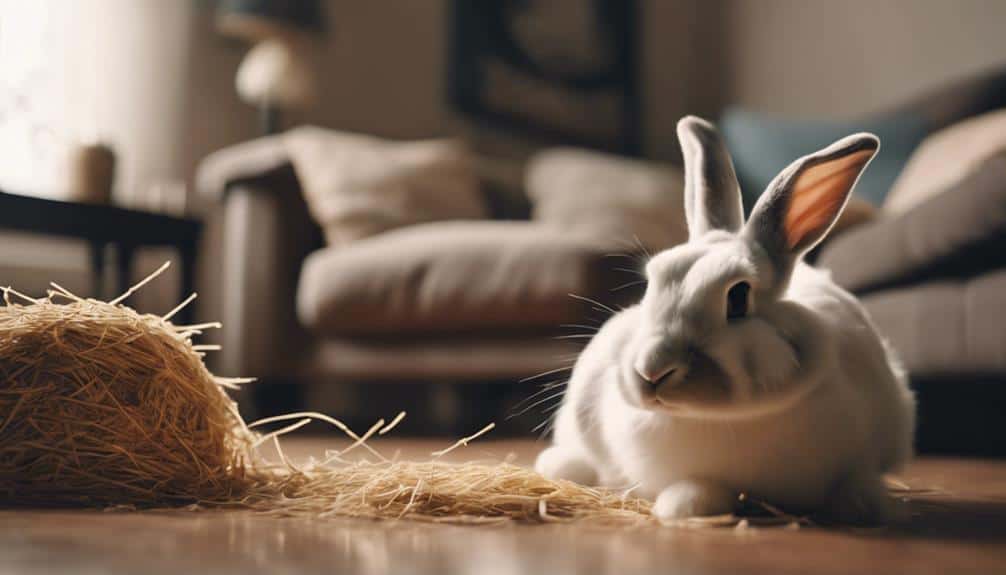
Owning a rabbit can be super rewarding. They make great pets for people who want a low-maintenance companion. With proper care and attention, rabbits can thrive and live up to 10 years or more, providing years of companionship and affection.
Rabbits are intelligent and social animals, so they need time and interaction to flourish. The good news is that they can be trained to use a litter box, perform tricks, and even navigate obstacle courses with ease. Plus, they're perfect for apartment dwellers or those with limited space since they're quiet and don't require a lot of room to roam.
One of the best things about owning a rabbit is that they're relatively low-cost pets compared to dogs and cats. The initial setup will cost you between $100 to $300, and monthly expenses average around $50 to $75. And with so many breeds, sizes, and colors to choose from, you can pick a pet that fits your lifestyle and preferences.
Cons of Owning Rabbits
Owning a rabbit can be tough. They need a lot of care and attention, which can be time-consuming and tiring.
Plus, they're prone to health issues, so you need to stay on top of their healthcare to keep them healthy.
It's not just about time, either.
Caring for a rabbit can be expensive.
You'll need to budget for food, vet bills, and supplies, and those costs can add up quickly.
High Maintenance Care
Caring for rabbits is a big responsibility that requires a lot of time, effort, and money. They live for a long time – 10 years or more – so you need to be prepared to make a long-term commitment to caring for them.
One of the biggest aspects of caring for rabbits is providing them with a suitable place to live. This means setting up a large enclosure that's safe and comfortable for them. You'll also need to get specific equipment, like food dishes, water bottles, and hiding places, which can be expensive.
Rabbits also have specific health and dietary needs that you'll need to meet. This means learning about potential health issues, like dental problems and parasites, and knowing how to prevent them. You'll also need to make sure they're getting a balanced diet that includes plenty of fresh veggies and hay.
Taking good care of a rabbit means providing a clean, safe living space, regular veterinary check-ups, and a healthy diet. It's a lot of work, and it can be expensive, so it's not a commitment to take lightly. If you're not prepared to put in the time and effort, a rabbit mightn't be the best pet for you.
Potential Health Concerns
When you decide to bring a rabbit into your home as a pet, it's crucial to be aware of potential health concerns that can affect them. Rabbits are prone to various health issues that can impact their quality of life, so it's essential to know what to look out for.
One major concern is dental issues, which can lead to serious complications if left untreated. You'll need to keep an eye on your rabbit's teeth and get them checked by a vet regularly.
Respiratory infections are another issue, often caused by poor ventilation in their living space.
It's also important to monitor your rabbit's weight and provide a balanced diet that's low in pellets and high in fresh veggies and hay. This can help prevent obesity-related problems. Rabbits can also suffer from heat stress, so make sure they've a cool, shaded area to retreat to when it gets hot outside.
Gastrointestinal stasis is another critical health issue in rabbits, which is why a high-fiber diet is vital for their digestive health.
Rabbit Behavior Insights
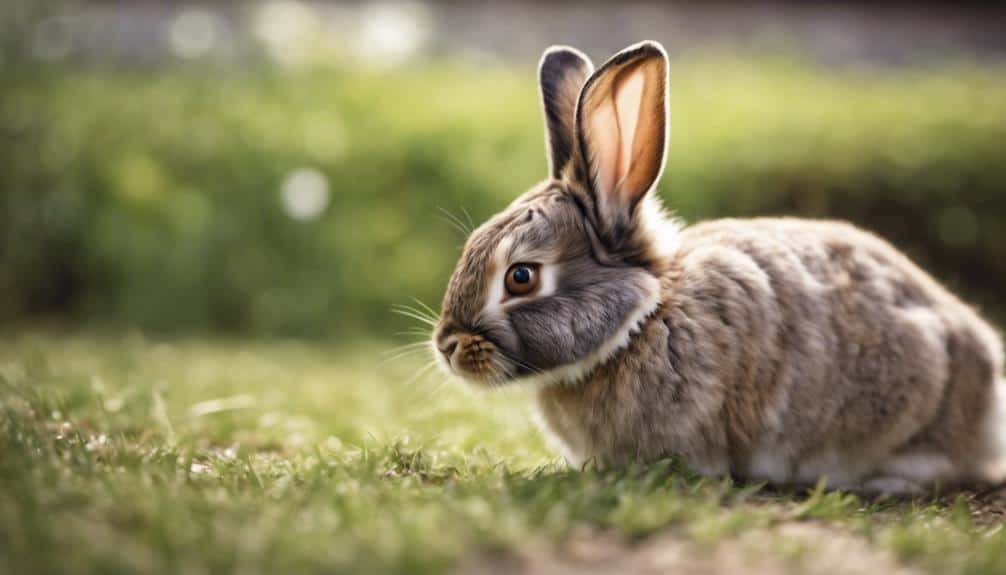
Rabbits have some pretty fascinating socialization habits that are worth taking a closer look at. When we understand how they communicate with each other, we can gain some valuable insights into their behavior.
So, have you ever wondered how rabbits interact with one another? Or how they behave around their human companions?
Let's dive in and explore the intricacies of rabbit socialization.
Socialization Habits of Rabbits
So, when it comes to rabbits, socialization is a big deal. They need regular interaction and attention to prevent behavioral issues. As social animals, rabbits make great pets when you spend time with them.
To keep them happy and healthy, you need to socialize them regularly, which means gentle handling and interaction. Creating a rabbit-proofed area within their home for exercise and play can also enhance their socialization experience.
Socialization is crucial because it prevents boredom and stress, and helps build trust and strengthen the bond between you and your rabbit.
It's best to start socializing your rabbit early, around 8 weeks old. Introduce them to new environments, people, and use positive reinforcement techniques like treats and praise to foster a loving relationship.
If you neglect socialization, your rabbit may develop behavioral problems, become fearful or aggressive, and even have health issues. This highlights the importance of investing time in your rabbit's social well-being.
Communication Methods of Rabbits
Understanding how rabbits communicate is essential for rabbit owners to accurately interpret their pets' behaviors. They use various methods to interact with their surroundings and humans.
As prey animals, rabbits rely on subtle cues to convey their feelings and intentions. They may thump their hind legs when they sense danger, or stamp their feet to express annoyance.
So, how do rabbits communicate with humans? They often display affection through gentle nuzzling, licking, or even hopping around joyfully. When they're happy, rabbits may perform binkies, which are joyful leaps in the air.
They also communicate through body language, such as ear position and tail movements.
Rabbits are crepuscular animals, meaning they're most active during dawn and dusk. During these hours, they're more likely to engage in communication behaviors, like running around, nudging, or vocalizing softly.
Health Considerations for Rabbits
Managing your pet rabbit's health requires a combination of vigilance, regular veterinary check-ups, and preventive measures like spaying or neutering.
Rabbits are prone to certain health issues. They can develop dental problems, respiratory infections, and gastrointestinal diseases. If left untreated, these conditions can be life-threatening.
Heat stress is another concern for rabbits. They can easily overheat, especially in temperatures above 28°C. If your rabbit is overheating, it may exhibit symptoms like weakness, convulsions, and even coma.
Regular veterinary check-ups are crucial. You should take your rabbit to a rabbit-savvy vet every 6-12 months. These visits help monitor your pet's health and catch any potential problems early on.
Spaying or neutering your rabbit is also important. This can prevent health issues like uterine cancer, aggression, and undesirable behaviors like spraying or mounting.
Rabbit Care Essentials
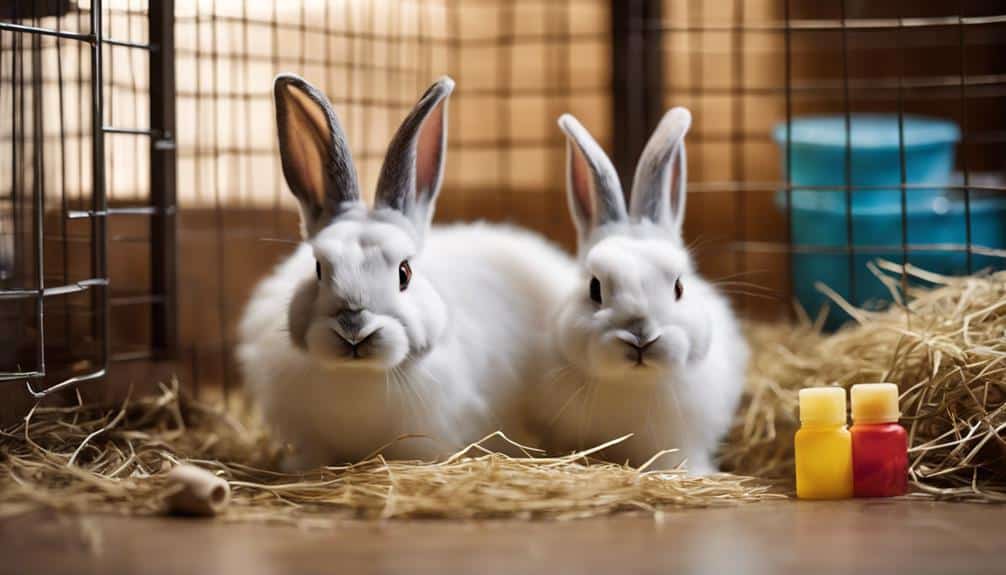
To take good care of your pet rabbit, you need to provide the right environment, diet, and exercise. This is crucial for their overall health.
When it comes to their living space, your rabbit needs a hutch that has both sheltered and open areas. This way, they can exercise and rest comfortably.
A rabbit's diet is also very important. They need unlimited access to grass hay to stay healthy and wear down their teeth.
Exercise is also essential. You should provide a safe area for your rabbit to run around and play with toys and obstacles every day.
Lastly, rabbits can be litter trained. Providing a designated area for toileting helps keep their hutch clean.
Rabbit Training Tips
Training your pet rabbit can be a super rewarding experience, but it does require patience and the right approach.
First things first, it's essential to start training your rabbit early. The ideal time is when they're between 8-12 weeks old. At this age, they're more receptive to learning, and it'll make the training process much smoother.
Positive reinforcement is a vital part of rabbit training. The idea is to offer treats and praise when your rabbit exhibits desired behaviors. This encourages them to repeat these actions, and eventually, they'll learn what you want them to do. For instance, if you want your rabbit to come when called, reward them with treats and praise when they respond correctly.
Clicker training is another effective way to train your rabbit. It involves using a clicker to associate a specific sound with rewards. When your rabbit performs the desired action, click the clicker and immediately offer a treat. This helps your rabbit understand which behaviors are being rewarded, making the learning process more efficient.
Lastly, make sure you provide your rabbit with a safe and rabbit-proofed area to exercise and play. This promotes good behavior, socialization, and overall well-being. A happy rabbit is a well-behaved rabbit, after all!
Housing Requirements for Rabbits
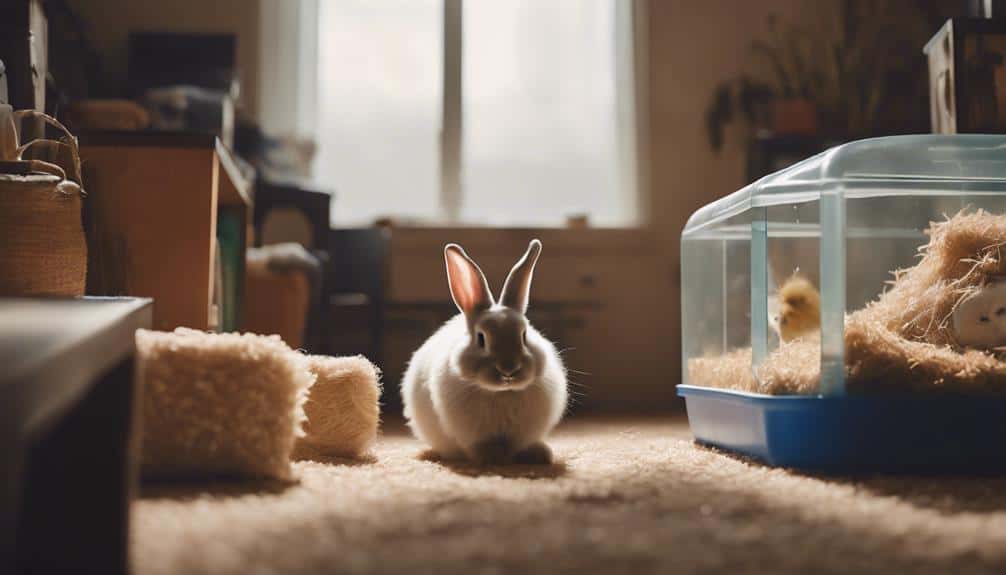
So you want to set up a safe and happy home for your pet rabbit. To do that, you need to get the housing just right.
Rabbits need a hutch that keeps them safe from predators and bad weather. This hutch should have a dark, dry area where they can rest and a bigger space for them to run around and do their business.
The hutch should be well-ventilated and made of wood, not metal, so it doesn't get too hot inside. It should be at least three times as long as your rabbit is, and twice as wide. And please, avoid wire floors – they can hurt your rabbit's feet.
You should put the hutch in a shady spot, even on days that aren't super hot, so it doesn't get too warm inside. To help keep things cool, you can even add some frozen drink bottles or ice bricks to the nesting area.
But a hutch isn't enough – your rabbit needs a separate space to run around and play every day. This is crucial for their physical and mental health.
Exercise helps prevent boredom, stress, and behavioral issues in rabbits, so they can thrive in their outdoor space.
Bonding With Your Rabbit
Establishing a strong bond with your rabbit is essential for fostering a trusting and fulfilling relationship.
So, how do you go about doing that? Well, for starters, it's crucial to spend quality time with your rabbit every day. This can be as simple as gentle petting, grooming sessions, or just sitting near your rabbit while they explore their environment.
Understanding your rabbit's body language is also vital for building a strong bond. You see, rabbits communicate in their own way, and it's up to you to learn their cues and behaviors. Pay attention to how they thump, position their ears, or grind their teeth – it's all part of understanding what they're trying to tell you.
Another great way to bond with your rabbit is to provide enrichment activities that stimulate their mind and body. This can be as fun as giving them puzzle toys, setting up tunnels, or hiding treats for them to find. It's a great way to engage with your rabbit and keep them active and happy.
Lastly, if you're thinking of getting a rabbit, consider adopting from a rabbit rescue. Not only will you be giving a rabbit a second chance at a loving home, but you'll also form a special bond through the act of caregiving.
Rabbit Diet and Nutrition
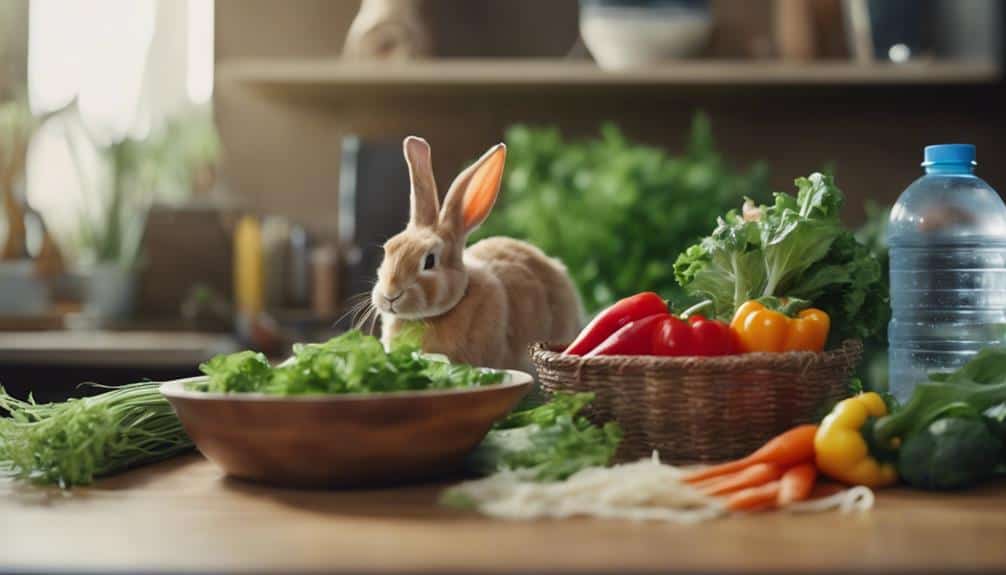
Understanding what your rabbit needs to eat and providing the right nutrition is super important. Rabbits need a diet that's rich in hay, fresh veggies, and just a little bit of pellets to get all the nutrients they need. Plus, they love to chew on hay and wooden toys, which helps keep their teeth healthy and prevents them from getting too long.
One thing to keep in mind is that male and female rabbits have different dietary needs, especially when they're breeding or pregnant. They might need some extra nutrients during those times. And, rabbits can be trained to use a litter box, which makes cleaning up after them way easier. Just remember to keep an eye on what they're eating, because some foods can be bad for their tummies.
Make sure your rabbit always has access to clean water. It's crucial for their health. Regular grooming is also a good idea, as it helps keep their fur soft and prevents matting. By paying attention to what your rabbit eats and taking care of their overall health, you can help them live a happy and healthy life.
Interactions With Other Pets
When you're introducing your rabbit to other pets, like dogs or cats, it's crucial to keep a close eye on them to ensure everyone's safety. You see, understanding each animal's body language and behavior cues can really help prevent misunderstandings and conflicts.
A gradual introduction process can work wonders in fostering positive relationships in a multi-pet household.
Bunny and Dogs
So you're thinking of having both a dog and a pet rabbit in the same household? That's not a bad idea, but you need to keep a few things in mind to make sure it works out.
First and foremost, supervision is key. You should always be watching when your dog and rabbit are interacting, especially when they first meet. This will help prevent any accidents or misunderstandings.
When introducing your dog and rabbit, do it in a controlled environment. Let them get used to each other's scents before they meet face-to-face. This will help them feel more comfortable around each other.
It's also important that your dog is well-trained and responds to commands. This will help you manage their behavior around the rabbit and prevent any problems.
Rabbit and Cats
So you want to create a peaceful coexistence between your rabbit and cats at home. That's totally doable, but you'll need to keep a close eye on them, especially when they first meet.
Indoor rabbits and cats can get along just fine, but you need to take some precautions. When introducing them, make sure your rabbit has a safe space to run to if needed – like a separate room or a secure enclosure. This is especially important for rabbits from shelters or rescues that might've had some rough experiences in the past.
Male rabbits can be pretty territorial, so introducing them to cats might take some extra patience. And let's face it – cats are natural predators, so they might see small animals like rabbits as prey. That's why you should always supervise their interactions.
To help them get along, try to create positive vibes between your rabbit and cats. Reward them when they behave calmly around each other, and make sure they've plenty of fun stuff to do.
In a household with multiple pets, it's a good idea to give each pet their own space. For example, you could make the living room your rabbit's hangout spot and the bedroom the cats' territory. By doing this, you can create a safe and harmonious environment for all your pets.
Multi-Pet Household Dynamics
Creating a harmonious environment in a multi-pet household with rabbits requires some careful planning.
First and foremost, you need to ensure your rabbit's safety. That means keeping them away from predators like dogs and cats, and providing secure spaces for them to retreat to when they feel threatened.
When introducing rabbits to other pets like guinea pigs or hamsters, it's essential to take it slow and do it under close supervision. You want to prevent territorial conflicts from arising, so monitor their behavior closely and intervene if necessary.
It's also crucial to be aware of prey drive when housing rabbits with other pets. For example, ferrets or birds of prey have strong predatory instincts, which can trigger a rabbit's natural instinct to flee. It's best to avoid housing them together to prevent stress and potential harm.
In multi-rabbit households, neutering or spaying is essential. This helps curb aggression, territorial behavior, and unwanted breeding. By doing so, you can create a more peaceful environment for all your pets.
Lastly, providing each animal with enough space and their own designated areas for essential activities can go a long way in reducing stress and promoting a peaceful coexistence among all pets.
Conclusion
Having a rabbit is kind of like taking care of a delicate garden. If you put in the right amount of care and attention, these smart and social little creatures can turn into amazing companions.
Rabbits need commitment and effort to thrive. You can't just leave them to their own devices and expect them to be happy and healthy. By understanding their behavior, providing the necessary care, and forming a strong bond with them, you can create a really harmonious and fulfilling relationship with your furry friend.
Before you decide to bring a rabbit into your home, think about the joys and responsibilities that come with owning one. It's not all cuddles and playtime – there's work involved too. But if you're willing to put in the effort, having a rabbit as a pet can be incredibly rewarding.


